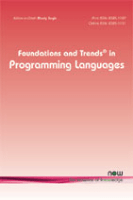
Foundations and Trends in Programming Languages
Scope & Guideline
Unraveling the Complexities of Programming Languages
Introduction
Aims and Scopes
- Dynamic Information Flow Control:
The journal emphasizes research in dynamic information flow control, exploring both fine- and coarse-grained approaches. This area is crucial for enhancing security and privacy in programming languages. - Probabilistic Semantics:
Research on probabilistic trace semantics is highlighted, focusing on how probabilistic models can improve the understanding of program behavior and testing methodologies. - Neurosymbolic Programming:
The integration of neural networks with symbolic reasoning is a key area of focus, reflecting the journal’s commitment to exploring cutting-edge intersections between AI and programming languages. - Type Systems and Refinement Types:
The journal explores advanced type systems, particularly refinement types, which enhance program correctness and safety, providing a theoretical basis for practical programming language design. - Tutorials and Educational Resources:
A commitment to providing tutorials and comprehensive resources for practitioners and researchers in the field, aiding in the dissemination of knowledge regarding complex programming concepts.
Trending and Emerging
- Integration of AI in Programming Languages:
There is a growing focus on neurosymbolic programming, indicating a trend towards integrating artificial intelligence with programming languages, which is pivotal for developing smarter systems. - Dynamic and Probabilistic Methodologies:
The rise of probabilistic trace and testing semantics suggests an increasing interest in dynamic methodologies that accommodate uncertainty and variability in program execution. - Educational Resources and Tutorials:
The journal's emphasis on tutorials and educational content reflects a trend towards making advanced programming concepts more accessible, catering to both new learners and experienced practitioners.
Declining or Waning
- Traditional Programming Paradigms:
There seems to be a waning interest in traditional programming paradigms, such as procedural and object-oriented programming. The recent focus has shifted towards more innovative and hybrid approaches, such as neurosymbolic programming. - Static Analysis Techniques:
There is a noticeable decrease in publications centered around traditional static analysis techniques, suggesting a move towards more dynamic and probabilistic approaches in language analysis. - Legacy Language Comparisons:
Research comparing legacy programming languages has become less frequent, indicating a shift away from historical analysis to more contemporary and relevant programming language issues.
Similar Journals

DISCRETE MATHEMATICS AND THEORETICAL COMPUTER SCIENCE
Exploring the Frontiers of Discrete Mathematics and Theoretical Computer ScienceDISCRETE MATHEMATICS AND THEORETICAL COMPUTER SCIENCE, published by DISCRETE MATHEMATICS THEORETICAL COMPUTER SCIENCE in France, stands as a significant open-access journal since 1997, publishing innovative research articles within the intersecting disciplines of discrete mathematics and theoretical computer science. With an ISSN of 1462-7264 and an E-ISSN of 1365-8050, this journal aims to provide a platform for scholarly discourse and dissemination of knowledge, making it accessible to a global audience. It is recognized for its contributions, achieving a Q2 ranking in both Computer Science (Miscellaneous) and Discrete Mathematics and Combinatorics, alongside a Q3 ranking in Theoretical Computer Science as of 2023. The journal’s rigorous selection process ensures that only high-quality research is published, promoting advancements in these critical areas of study. Researchers, professionals, and students alike can benefit from its comprehensive articles that not only enhance theoretical understanding but also foster practical applications in the ever-evolving landscape of computer science.

Fuzzy Optimization and Decision Making
Innovating Solutions in Artificial Intelligence and OptimizationFuzzy Optimization and Decision Making, published by Springer, is a prestigious academic journal that has made significant contributions to the fields of Artificial Intelligence, Logic, and Software. With an impressive impact factor and a consistent ranking in the top Q1 quartile across its categories, this journal stands at the forefront of research dissemination in its domain. Established in 2002 and continuing through 2024, the journal focuses on the theoretical and practical aspects of fuzzy optimization methods and their applications in decision-making scenarios. The journal is highly regarded for its rigorous peer-review process and aims to present innovative research findings that inspire advancements in optimization techniques using fuzzy logic. Aimed at researchers, professionals, and students alike, Fuzzy Optimization and Decision Making serves as an essential resource for those looking to stay at the cutting edge of technology and methodology in mathematics and computer science.
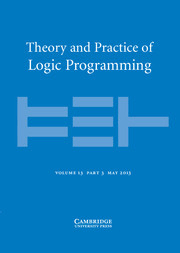
THEORY AND PRACTICE OF LOGIC PROGRAMMING
Bridging Theory and Practice in Computational Excellence.THEORY AND PRACTICE OF LOGIC PROGRAMMING, published by Cambridge University Press, is a premier academic journal that delves into the evolving field of logic programming, offering insights and advancements from 2001 to 2024. With an ISSN of 1471-0684 and an E-ISSN of 1475-3081, this journal serves as a vital resource for researchers, professionals, and students interested in areas such as artificial intelligence, computational theory, and software development. In 2023, the journal was recognized for its excellence, achieving Q1 status in Computational Theory and Mathematics and Q2 in several other categories, underscoring its significant impact within the academic community. Despite not being open access, its robust content, curated by esteemed scholars, guarantees high-quality research and innovative methodologies that are crucial for advancing the field. The journal's rigorous peer-review process and its standings in Scopus rankings further emphasize its relevance and authority, making it a quintessential platform for disseminating key findings and fostering scholarly dialogue.
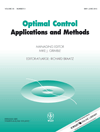
OPTIMAL CONTROL APPLICATIONS & METHODS
Pioneering insights in applied mathematics since 1980.OPTIMAL CONTROL APPLICATIONS & METHODS, published by WILEY, is a prestigious academic journal dedicated to advancing the field of applied mathematics, control, and optimization. With an impressive impact factor in its respective categories—ranking in the second quartile for Applied Mathematics, Control and Optimization, and Control and Systems Engineering—the journal serves as a vital platform for disseminating innovative research findings and methodologies from 1980 to 2024. The journal is indexed in Scopus, with notable rankings in its discipline, highlighting its significance in the scientific community; specifically, it is ranked 143rd in Applied Mathematics and 35th in Control and Optimization, underscoring the quality and relevance of the research it publishes. Although not an open-access journal, it provides essential insights and methodologies of paramount importance to researchers, professionals, and students committed to the fields of control theory and systems engineering. It continues to foster knowledge and collaboration among experts to address complex challenges in automation and optimization.
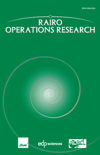
RAIRO-OPERATIONS RESEARCH
Advancing the frontiers of operations research and management science.RAIRO-Operations Research is a distinguished journal published by EDP Sciences S A, focusing on the intricate fields of operations research, management science, and computer science applications. Established in 1977, this French-based journal encompasses a rich legacy of contributing to theoretical advancements and practical applications that equip researchers, professionals, and students with the insights necessary to navigate complex decision-making environments. With a notable Scopus ranking in various categories, including a Q3 position in Computer Science Applications, Management Science and Operations Research, and Theoretical Computer Science, the journal aims to foster innovation and share impactful research findings. As an insightful platform, RAIRO-Operations Research is essential for those seeking to deepen their understanding and enhance their expertise in operational methodologies, while also offering a range of access options for its wide readership. Delve into the journal to explore transformative research that pushes the boundaries of operations research.

Journal of Object Technology
Advancing the Frontiers of Object-Oriented InnovationJournal of Object Technology is a premier publication housed under the esteemed JOURNAL OBJECT TECHNOLOGY in Switzerland, dedicated to advancing the field of software engineering and technology. With a history of continuous publication since 2002, this journal serves as a platform for innovative research, critical reviews, and case studies that explore the nuances of object-oriented technologies and their applications in software development. Although currently categorized in the lower quartile (Q4), this journal's focus on relevant and emerging topics remains vital for researchers, professionals, and students alike, seeking to enhance their understanding of contemporary software-related issues. Addressing significant milestones and offering insights into future directions, the Journal of Object Technology plays an essential role in the evolving landscape of computer science, providing open access opportunities that ensure wide dissemination of knowledge. Situated at ETH Zurich, the journal is committed to fostering collaboration and dialogue among researchers worldwide, underscoring its importance within the global scholarly community.
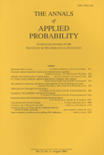
ANNALS OF APPLIED PROBABILITY
Advancing the Frontiers of Applied ProbabilityANNALS OF APPLIED PROBABILITY is a prestigious journal dedicated to advancing the field of applied probability, providing a platform for rigorous research and innovative applications. Published by the Institute of Mathematical Statistics (IMS), this journal has earned a reputable standing in the academic community, reflected in its 2023 ranking as Q1 in both Statistics and Probability and Statistics, Probability and Uncertainty. With a focus on disseminating high-quality articles, it plays a critical role in bridging theoretical advancements and practical applications in various domains of probability. The journal features a robust editorial process and attracts contributions from leading researchers, fostering a vibrant discourse essential for academic and professional development. Researchers and practitioners seeking to deepen their knowledge and stimulate intellectual growth will find the ANNALS OF APPLIED PROBABILITY an invaluable resource, with its significance exemplified by its Scopus rankings that showcase its influence within the statistics community.

Journal of Computer Languages
Empowering Knowledge in Computer LanguagesJournal of Computer Languages, published by ELSEVIER SCI LTD in the United Kingdom, serves as a crucial platform for advancing research and discussion in the fields of computer networks, human-computer interaction, and software development. With an ISSN of 2590-1184 and E-ISSN 2665-9182, this journal has established itself as a prominent resource within its category, achieving Q3 rankings in 2023 across its respective domains. As part of Scopus' indexed journals, it stands at impressive ranks of #152/395 in Computer Networks and Communications, #172/407 in Software, and #76/145 in Human-Computer Interaction, reflecting its relevance and contribution to the scholarly community. Operating under an open access model, the journal emphasizes accessibility and collaboration among researchers, professionals, and students keen on exploring innovative applications and advancements in computer languages. With a publication span extending from 2019 to 2024, the year-to-year growth reinforces its commitment to impacting both academia and industry significantly. Engage with cutting-edge research and foster your understanding in computer languages through this essential publication.

Frontiers of Computer Science
Empowering the Global Academic Community through Open AccessFrontiers of Computer Science is a leading peer-reviewed journal dedicated to advancing the field of computer science through the publication of high-quality research articles, reviews, and theoretical discussions. Published by HIGHER EDUCATION PRESS, this journal has gained significant recognition, currently boasting a prestigious impact factor and ranking in the Q1 quartile for both Computer Science (miscellaneous) and Theoretical Computer Science categories in 2023. With a focus on the intersection of computational theory and practical applications, it serves as a vital platform for researchers, professionals, and students alike who are eager to contribute to and stay updated with groundbreaking developments. The journal’s scope encompasses a wide range of topics, reflecting the diverse nature of computer science today. Operating from Beijing, China, it emphasizes Open Access, ensuring that vital research is readily available to the global academic community. With its convergence period spanning from 2013 to 2024, Frontiers of Computer Science remains committed to fostering innovation and scholarly dialogue that drives the future of technology.
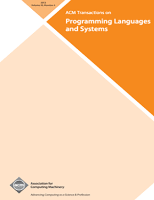
ACM TRANSACTIONS ON PROGRAMMING LANGUAGES AND SYSTEMS
Elevating Standards in Programming Language ResearchACM Transactions on Programming Languages and Systems (ISSN: 0164-0925, E-ISSN: 1558-4593) is a prestigious journal published by the Association for Computing Machinery, focusing on advancing the field of programming languages and systems. Established in 1979, this enduring publication has become a significant resource for researchers and practitioners alike, with a convergence extending to 2024. The journal maintains a strong presence in the academic community, currently placed in the Q2 category for Software in 2023, demonstrating its commitment to high-quality research. With a Scopus ranking of #260 out of 407 in Computer Science Software, it highlights a unique niche that bridges theoretical foundations and practical implementations. Although it does not offer open access, the journal ensures quality dissemination of tools, methodologies, and innovations that cater to both seasoned professionals and emerging scholars. The ACM Transactions on Programming Languages and Systems thus plays a crucial role in shaping the future of programming languages and their applications, making it an essential read for anyone vested in the field.